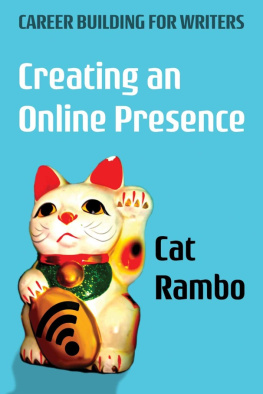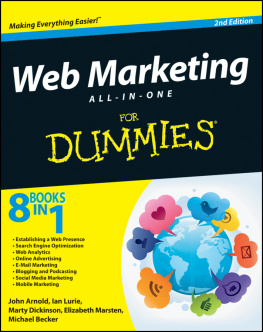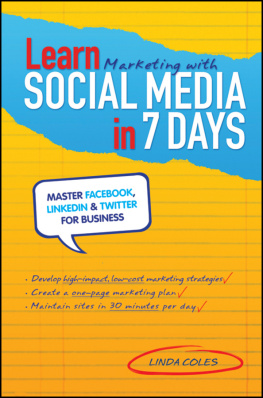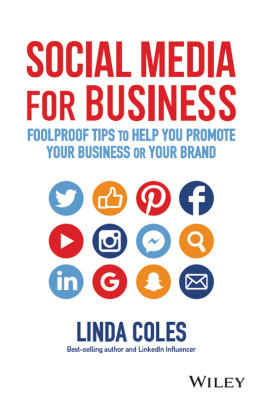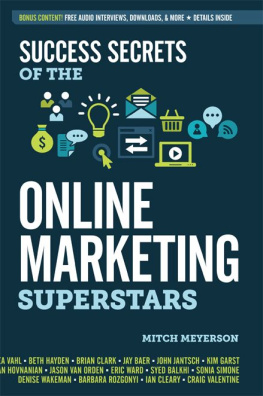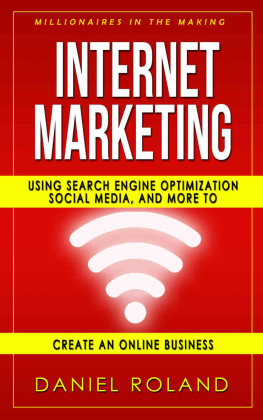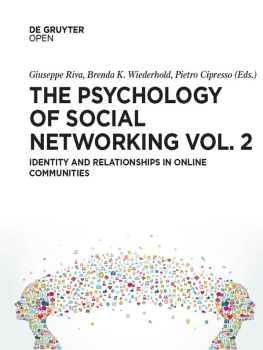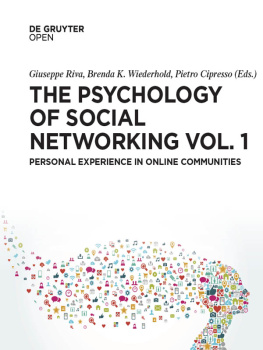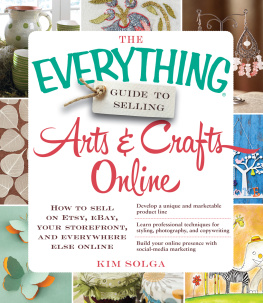Rambo - Creating an Online Presence
Here you can read online Rambo - Creating an Online Presence full text of the book (entire story) in english for free. Download pdf and epub, get meaning, cover and reviews about this ebook. year: 2013, genre: Romance novel. Description of the work, (preface) as well as reviews are available. Best literature library LitArk.com created for fans of good reading and offers a wide selection of genres:
Romance novel
Science fiction
Adventure
Detective
Science
History
Home and family
Prose
Art
Politics
Computer
Non-fiction
Religion
Business
Children
Humor
Choose a favorite category and find really read worthwhile books. Enjoy immersion in the world of imagination, feel the emotions of the characters or learn something new for yourself, make an fascinating discovery.
- Book:Creating an Online Presence
- Author:
- Genre:
- Year:2013
- Rating:3 / 5
- Favourites:Add to favourites
- Your mark:
- 60
- 1
- 2
- 3
- 4
- 5
Creating an Online Presence: summary, description and annotation
We offer to read an annotation, description, summary or preface (depends on what the author of the book "Creating an Online Presence" wrote himself). If you haven't found the necessary information about the book — write in the comments, we will try to find it.
Rambo: author's other books
Who wrote Creating an Online Presence? Find out the surname, the name of the author of the book and a list of all author's works by series.
Creating an Online Presence — read online for free the complete book (whole text) full work
Below is the text of the book, divided by pages. System saving the place of the last page read, allows you to conveniently read the book "Creating an Online Presence" online for free, without having to search again every time where you left off. Put a bookmark, and you can go to the page where you finished reading at any time.
Font size:
Interval:
Bookmark:
Career-building for Writers: Creating an Online Presence
by Cat Rambo
2013 Cat Rambo
Contents
Foreword
This book grew out of an online class, which grew out of a real-life class, which in turn grew out of a totally different real-life class.
When I designed my first writing fantasy and science fiction class for Bellevue College, I devoted the final class session to career stuff. In classes that followed, questions about blogging and online promotion took up more and more time. I proposed a class to Bellevue College about blogging and social networking, a basic introduction for people who wanted to learn how to establish and grow an online presence, perhaps for personal reasons, for their own business, or for their employer. The class proved surprisingly popular, and I teaching both the virtual and non-virtual version on a regular basis.
When I began teaching online, including a class on creating one's online presence seemed like a no-brainer, but this time I wanted to focus specifically on authors and what an online presence could do for them.
I enjoy teaching the class because it demands constant updating in terms of resources, practices, and even new opportunities. Learning about such things in order to teach them has been a great way to discover them for my own use. I thought that an e-book might be something that would appeal to people unable to take the class.>
Who is this book aimed at? The utterly bewildered as well as the semi-savvy, but even if you are wise in the ways of the Internet, you may still pick up a trick or two. At the least, it should prove a good starting point when figuring out your next book promotion.
You will, unless you are very lucky, have to think about book promotion at some point or another. Electronic publishing, both in e-book form and online, is changing publishing as we know it. At the same time, publishing houses increasingly reserve their publicity budget for their top earners, forcing new and mid-list authors to pick up the slack.
Maybe you've just started writing and are thinking about creating a presence that will help you build your name as a writer. Maybe you've already accumulated some writing credits and are looking to expand your online presence and give your career further momentum. Maybe you're an established writer, but you haven't done much with all this online stuff. Can you actually use it to sell books? Most certainly.
Maybe you've got a solid presence already and want to expand that or make it more efficient -- without losing precious writing time in the process. In any of these cases, you should find useful information in this book.
This book assumes some familiarity with the Internet: that you're using e-mail, you are familiar with the concept of blogs, and you know what Facebook and Twitter are. If not, I'd suggest picking up something like The Internet for Dummies and working through it before coming back to this book. I've include some avenues for the highly technically adept to explore but have marked these clearly.
The book also assumes a limited budget. Primarily I've tried to steer people towards free tools, and noted when there are expanded options available for paid memberships.
I've spent plenty of time over the last decade researching how to promote oneself and one's books online but I also possess three decades of experience interacting with online communities and on the Internet at large. The many ways the Internet is changing our lives is endlessly fascinating to me, and I enjoy playing around online and learning new technologies. I've found myself helping other writers navigate some of the intricacies of online life, and I hope that this book will help even more people.
Some of the content appeared originally either on the SFWA blog, my personal blog, or both places.
I am always delighted to get feedback and suggestions for upcoming versions of the book and the class, so I urge you to mail me at . I have undoubtedly left things out. Please let me know what they are.
Acknowledgements
Thank you to the scores of students who've come through the online and classroom versions of the classes these notes draw upon.
A special thanks to Catherine Brennan, Matt Champine, Mia Coleman, Caren Gussoff, Andrew Hilmer, Tamara MacNeil, Eden Royce, Frances Rowat, Peter Smalley, Bonnie Jo Stufflebeam, and Django Wexler for offering comments on the early version.
Thank you to Neil Clarke for formatting advice and pointers.
Much gratitude to graphic designer extraordinaire Vicki Saunders, who produced the excellent cover.
And, as always, Wayne, who puts up with my obsessions.
Chapter One: Before You Begin
A little time spent planning now will pay off ten-fold down the line. Figuring out what you want to do with your online presence, how much time you want to invest in it, how you'll measure success, and how to best maintain your privacy are all things you'll want to contemplate before getting started.
What Do You Want to Accomplish?
The most important thing you must decide about creating an online presence is what you want to accomplish with it. This helps you plan how to achieve that as well as providing criteria for success.
Do you want to:
- Make yourself more discoverable to readers who have found a piece of work by you and want to read more?
- Reach readers who read in your genre but haven't encountered your work previously?
- Build an audience for your work that will buy it when it appears?
- Sell already existing work, either by pointing to sites where it can be found or by allowing people to buy it directly from your site?
- Advertise associated services, such as manuscript editing, classes, or artwork?
- Reinforce your brand, i.e. letting people know what they can expect from projects associated with you?
- Achieve some combination of the above?
Take a moment now and jot down three things you want to accomplish with your Internet presence, then how much time -- realistically -- you're willing to spend.
Very little? You may want to set up a basic blog that you post to once a week with writing news if you have it, or a sample of what you're working on it when you don't. Use the blog in turn to create a minimal social network presence by having the posts automatically appear on one or more networks, such as Facebook and Twitter.
A bit more time than that? Figure out where you want to spend that time. Perhaps with Google Analytics, learning how to identify which posts get shared or responded to. Or maybe you want to expand your reach by adding some additional social networks or maintaining an active presence on a reader community like GoodReads or Shelfari.
All the time in the world? I can show you plenty of ways to occupy yourself. But remember that writing always comes first.
Self-promotion can become procrastination, particularly if you're playing on Facebook or Twitter while pretending it's all in the name of building your fan base. Having the biggest Twitter following in the world won't help you unless you've got something to promote.
Your Online Persona
You will also want to think about your online persona, how you present yourself on the Internet. While your persona may resemble your real life being closely, there are sometimes things that you will not want to reveal online. Thinking about how far you want to go when talking about personal issues, politics, or other possibly contentious topics beforehand will help you make the right call when the occasion arises.
Some writers choose not to talk about politics at all online, because they don't want to alienate potential readers. Others feel comfortable doing so. Similarly, some people may choose to reveal deeply personal information. When writer Jay Lake, for example, discovered he had cancer, the process of his struggle with it was quite openly discussed on his blog, and became a source of significant support for Jay. Others may not feel as comfortable revealing personal details.
Next pageFont size:
Interval:
Bookmark:
Similar books «Creating an Online Presence»
Look at similar books to Creating an Online Presence. We have selected literature similar in name and meaning in the hope of providing readers with more options to find new, interesting, not yet read works.
Discussion, reviews of the book Creating an Online Presence and just readers' own opinions. Leave your comments, write what you think about the work, its meaning or the main characters. Specify what exactly you liked and what you didn't like, and why you think so.

